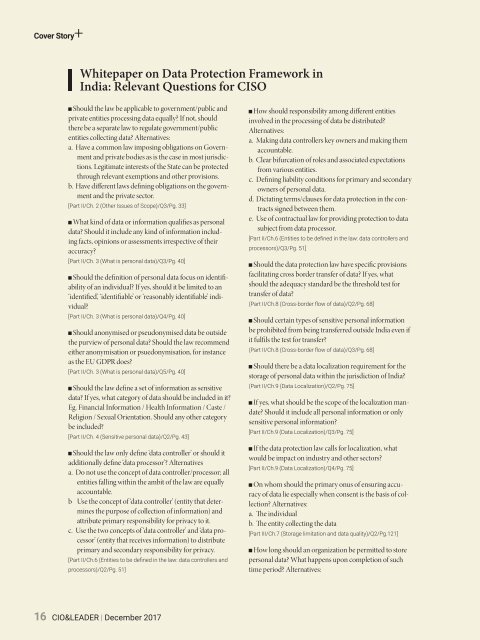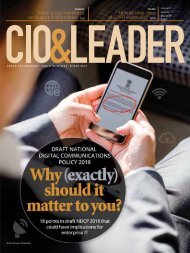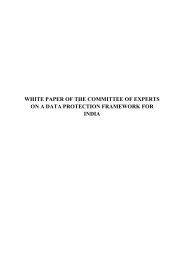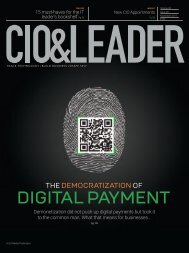C&L_December 2017 (1)
Create successful ePaper yourself
Turn your PDF publications into a flip-book with our unique Google optimized e-Paper software.
Cover Story+<br />
Whitepaper on Data Protection Framework in<br />
India: Relevant Questions for CISO<br />
Should the law be applicable to government/public and<br />
private entities processing data equally? If not, should<br />
there be a separate law to regulate government/public<br />
entities collecting data? Alternatives:<br />
a. Have a common law imposing obligations on Government<br />
and private bodies as is the case in most jurisdictions.<br />
Legitimate interests of the State can be protected<br />
through relevant exemptions and other provisions.<br />
b. Have different laws defining obligations on the government<br />
and the private sector.<br />
[Part II/Ch. 2 (Other Issues of Scope)/Q3/Pg. 33]<br />
What kind of data or information qualifies as personal<br />
data? Should it include any kind of information including<br />
facts, opinions or assessments irrespective of their<br />
accuracy?<br />
[Part II/Ch. 3 (What is personal data)/Q3/Pg. 40]<br />
Should the definition of personal data focus on identifiability<br />
of an individual? If yes, should it be limited to an<br />
‘identified’, ‘identifiable’ or ‘reasonably identifiable’ individual?<br />
[Part II/Ch. 3 (What is personal data)/Q4/Pg. 40]<br />
Should anonymised or pseudonymised data be outside<br />
the purview of personal data? Should the law recommend<br />
either anonymisation or psuedonymisation, for instance<br />
as the EU GDPR does?<br />
[Part II/Ch. 3 (What is personal data)/Q5/Pg. 40]<br />
Should the law define a set of information as sensitive<br />
data? If yes, what category of data should be included in it?<br />
Eg. Financial Information / Health Information / Caste /<br />
Religion / Sexual Orientation. Should any other category<br />
be included?<br />
[Part II/Ch. 4 (Sensitive personal data)/Q2/Pg. 43]<br />
Should the law only define ‘data controller’ or should it<br />
additionally define ‘data processor’? Alternatives<br />
a. Do not use the concept of data controller/processor; all<br />
entities falling within the ambit of the law are equally<br />
accountable.<br />
b Use the concept of ‘data controller’ (entity that determines<br />
the purpose of collection of information) and<br />
attribute primary responsibility for privacy to it.<br />
c. Use the two concepts of ‘data controller’ and ‘data processor’<br />
(entity that receives information) to distribute<br />
primary and secondary responsibility for privacy.<br />
[Part II/Ch.6 (Entities to be defined in the law: data controllers and<br />
processors)/Q2/Pg. 51]<br />
How should responsibility among different entities<br />
involved in the processing of data be distributed?<br />
Alternatives:<br />
a. Making data controllers key owners and making them<br />
accountable.<br />
b. Clear bifurcation of roles and associated expectations<br />
from various entities.<br />
c. Defining liability conditions for primary and secondary<br />
owners of personal data.<br />
d. Dictating terms/clauses for data protection in the contracts<br />
signed between them.<br />
e. Use of contractual law for providing protection to data<br />
subject from data processor.<br />
[Part II/Ch.6 (Entities to be defined in the law: data controllers and<br />
processors)/Q3/Pg. 51]<br />
Should the data protection law have specific provisions<br />
facilitating cross border transfer of data? If yes, what<br />
should the adequacy standard be the threshold test for<br />
transfer of data?<br />
(Part II/Ch.8 (Cross-border flow of data)/Q2/Pg. 68]<br />
Should certain types of sensitive personal information<br />
be prohibited from being transferred outside India even if<br />
it fulfils the test for transfer?<br />
(Part II/Ch.8 (Cross-border flow of data)/Q3/Pg. 68]<br />
Should there be a data localization requirement for the<br />
storage of personal data within the jurisdiction of India?<br />
(Part II/Ch.9 (Data Localization)/Q2/Pg. 75]<br />
If yes, what should be the scope of the localization mandate?<br />
Should it include all personal information or only<br />
sensitive personal information?<br />
[Part II/Ch.9 (Data Localization)/Q3/Pg. 75]<br />
If the data protection law calls for localization, what<br />
would be impact on industry and other sectors?<br />
[Part II/Ch.9 (Data Localization)/Q4/Pg. 75]<br />
On whom should the primary onus of ensuring accuracy<br />
of data lie especially when consent is the basis of collection?<br />
Alternatives:<br />
a. The individual<br />
b. The entity collecting the data<br />
[Part III/Ch.7 (Storage limitation and data quality)/Q2/Pg.121]<br />
How long should an organization be permitted to store<br />
personal data? What happens upon completion of such<br />
time period? Alternatives:<br />
16 CIO&LEADER | <strong>December</strong> <strong>2017</strong>














